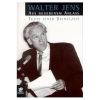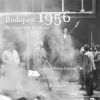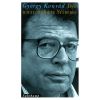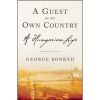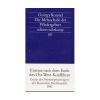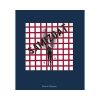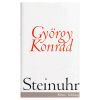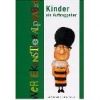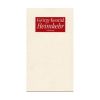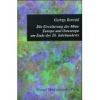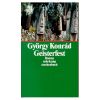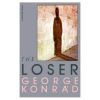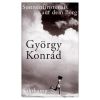Newest

|
The city builder Dalkey Archive Press - Eastern European Literature Series, 2007 |
Biographical Information
George Konrád was born at the university hospital in Debrecen on April 2, 1933. He spent the first eleven years of his life in Berettyóújfalu in eastern Hungary. His father József Konrád (1897–1970) was a successful hardware merchant; his mother, Róza Klein (1905-2004) came from the Nagyvárad Jewish bourgeoisie. His sister Éva, born in 1930, is currently a biologist living in New York. George Konrád attended the local Jewish elementary school, then one year of middle school, until the spring of 1944.
After the German occupation of Hungary, the Gestapo and Hungarian gendarmerie arrested his parents and deported them to Austria. The two children, together with two cousins István and Pál Zádor, managed with difficulty to procure travel permits enabling them to visit their relatives in Budapest. The following day, every Jewish inhabitant of Berettyóújfalu was deported to the ghetto in Nagyvárad, and from there to Auschwitz. Konrád's classmates were, almost without exception, all killed in Birkenau. The two children and their cousins survived the Holocaust in a safe house under Swiss sponsorship, thanks to their great aunt Zsófia Vágó.
At the end of February 1945, Eva and George returned to Berettyóújfaluba. Finding their house empty, and no word from their parents, they were taken in by László Kun, an older cousin who lived in Bucharest. In June of 1945, their parents returned home from deportation, and the Konrád family ultimately survived intact, the only such family among the some 1000 Jewish inhabitants of Berettyóújfalu. His father continued his hardware business, and adopted Konrád's now-orphaned cousins. He spent 1945 as a home student, beginning studies in 1946 at the Main Reformed Gimnázium in Debrecen, and resident of the illustrious Reformed College there. From 1947 to 1951, he attended the Madách Gimnáziumba in Budapest.
In 1950, when the state appropriated his father's business and the family residence, Konrád's parents moved in with their children studying in Budapest. The story of Konrád's survival as a child is told in his autobiographical novel Departure and Return (Hungarian version 2001).
Because of his bourgeois family background, in 1951 he was able to find work only in the University Russian Institute, but was dismissed in April of 1953, when the institution was renamed after Lenin. In the fall of 1953, he began studies in the Department of Hungarian at Loránt Eötvös University, which he completed in 1956. He was expelled from that institution as well on two occasions, but was able to continue his studies through the intervention of his professors George Lukács and István Sőtér. He wrote his final thesis on Károly Papp.
In 1955 he married his university classmate Vera Varsa, with whom he lived until 1963. Also in 1955, his first publication appeared in the periodical Új Hang (New Voice). In the fall of 1956, he joined the editorial board at Életképek, a journal critical in tone that was just getting its start.
During the 1956 Revolution, he rejoined his university community. Now a member of the National Guard, which drew its ranks from university students, he moved through the city with a machine gun, motivated by curiosity more than anything else. He never used his weapon. His workplace was soon closed down, and his friends, his sister, and his cousins emigrated to the West. Konrád chose to remain in the country.
He made his living through ad hoc jobs: he was a tutor, wrote reader reports, translated, and worked as a factory hand. Beginning in the summer of 1959, he secured steady employment as a children's welfare supervisor in Budapest's seventh District. He remained there for seven years, during which time he amassed the experiences that would serve as the basis for his novel The Case Worker.
In 1963 he married journalist and writer Júlia Lángh, then still a university student. They had two children, Anna Dóra in 1965, and Miklós István in 1967.
At the beginning of the 60s, Konrád was one of a circle of young, non-official authors, associated with periodicals and coffeehouse tables, who met socially from time to time. His circle of closest friends included Gyula Hernádi, Miklós Mészöly, Ferenc Fehér, Mihály Sükösd, Miklós Jancsó, and Károly Makk. Between 1960 and 1965 he was also employed as a reader at the Magyar Helikon publishing house, where he was chief editor of works by Gogol, Turgenev, Tolstoy, Dostoevsky, Babel, and Balzac.
His essays appeared in the journals Jelenkor, Kortárs, Nagyvilág, and Valóság.
In 1965, he changed employment, joining the Urban Science and Planning Institute, there undertaking research in urban sociology with the sociological research group of the Hungarian Academy of Sciences. He was now working closely with urban sociologist Iván Szelényi. Numerous studies were the fruit of this collaboration: one book On the Sociological Problems of the New Housing Developments (1969) and two extensive works on the management of the country’s regional zones, as well as on urbanistic and ecological trends in Hungary.
Konrád and Szelényi frequently travelled to the countryside. Between 1967 and 1972, they supervised comprehensive sociological research on the entire cities of Pécs and Szeged. It is during this period that Konrád writes his first novel, The Case Worker (1969), which drew a vigorous and mixed response: the official criticism was negative, while unofficially the book was positively received, selling out of bookstores in days. It was soon translated into 13 languages, and well regarded by leading publishers and critics abroad as well as writers at home. According to Irving Howe, leading American critic of the time, this book alone established Konrád in the forefront of European literature.
His experiences as an urbanist provided material for his next novel, The City Builder, in which he radically extended the experiments in language and form, and the condensation and accumulation of metaphor that marked The Case Worker. “Hier spricht ein Wahnsinniger” – “Here speaks a madman,” wrote one German critic, within a review of highest praise. The City Builder was allowed to appear in Hungarian only in censored form from Magvető Publishers in 1977. It was published abroad by Suhrkamp, Seuil, Harcourt Brace Jovanovitch, and Philip Roth’s Penguin Series, with a foreword by Carlos Fuentes.
Konrád’s collaboration with Iván Szelényi evolved into a profound friendship. A summary of their experiences furnished an outline for their conception of social theory, which they presented in 1974, in their book The Intellectuals on the Road to Class Power. Together they rented a house in Csobánka, a village not far from Budapest, and developed a technique for writing together. There was plenty of time for this, as Konrád had lost his job by order of the political police in July of 1973. For half a year he worked as a nurse’s aide at the work-therapy-based mental institution at Doba.
By this time the critical intelligentsia was organizing more decisively, and preliminary studies and articles by members of the democratic opposition began to appear. Konrád had high regard for the factory sociography A Worker in a Workers’ State by his young friend Miklós Haraszti, and was attempting to have it smuggled abroad when the police confiscated the manuscript at the border, and the state attorney put Haraszti on trial in the summer of 1973. Konrád was placed on probation and forbidden to travel for three years, while Haraszti was given a suspended prison sentence.
In May of 1974, shortly after the completion of The Intellectuals intended for foreign publication, the political police went into operation against the two authors: all of their residences were bugged, they were personally followed everywhere by agents, and their houses were searched. In the course of these searches, a significant part of Konrád’s diaries were confiscated and the authors arrested for agitation against the state. They were placed on probation and informed that they would be permitted to emigrate with their families. Szelényi accepted the offer, while Konrád remained, choosing internal emigration and all that it entailed. A smuggled manuscript of The Intellectuals on the Road to Class Power found its publishers abroad; it was translated into several languages and has a place on numerous university reading lists to this day.
In an interview for Die Zeit in 1974, Konrád described his principles for publication: “I write what I write; the state publishing houses in Hungary publish of my work what they will, while I publish as much of it as I can.” This included both domestic samizdat and the choice of western publishers free from the constraints of censorship and requirements of official permission. Virtually from this period until 1989, Konrád was a forbidden author in Hungary, deprived of all legal income. He made a living from honoraria abroad. His works were placed in restricted sections in libraries, designated in the catalogues by the letter Z. Naturally he was also forbidden from speaking on radio or television.
The prohibition against travel expired in 1976. Since his two novels had already appeared in German, the Berlin artists’ program board of the German Academic Exchange Service (DAAD) offered him a one-year fellowship. Konrád spent a year in Berlin, then another year in the United States on a stipend from his American publisher. During this period, he wrote his novel The Loser. He was by then living separately from his wife, who had settled in Paris with their two children.
Since 1979, Konrád has lived with Judit Lakner, his third wife and a specialist in French history, as well as an author of historical scholarship and children’s books. Together they have three children, Áron (1986), József (1987), and Zsuzsanna (1994).
Between 1977 and 1982, two volumes of Konrád’s essays appeared: The Temptation of Autonomy (not translated into English) and Antipolitics. These works called into question the entire European political status quo. Antipolitics portrayed the Yalta Agreement, foundation of the European bloc system, as the potential cause of a possible Third World War. The book’s subtitle was Central-European Meditations, and it was to become one of the voices demanding that region’s secession from the Soviet bloc as a requisite for peace in Europe. Konrád was one of the first to predict the imminent disappearance of the Iron Curtain. In 1984, he read his essay “Does the Dream of Central Europe Still Exist?” in the Schwarzenberg Palace as he received the Herder Prize from the University of Vienna. Critics have compared his essays to the writings of Adam Michnik, Milan Kundera, Václav Havel, Czeslaw Milos and Danilo Kiš. During his time in Germany, he came into contact with the independent peace movement there, whose talk was not merely of reducing the missile stockpiles but also putting an end to the division of Europe, and that of Germany within it.
Between 1973 and 1989, there developed in Hungary what was more or less a circle of friends that constituted the nexus of the political and artistic subculture, independent of official culture. Konrád was one of the determining voices in this democratic opposition, which expressed itself in many spheres. His work appeared in the samizdat journals of the opposition: Beszélő, Hírmondó, and others. His books were published by AB, Gábor Demszky’s samizdat house. In interviews granted to Radio Free Europe, Konrad’s thinking reached a wider Hungarian audience.
Beginning in September of 1982, he was a year-long guest at the Wissenschaftskolleg zu Berlin; the following year he received a fellowship at the New York Institute for the Humanities. His novel The Loser was published during this time.
Over the four years that followed, Konrád wrote A Feast in the Garden (Hungarian version 1985). Now released from the official prohibition against publication, he sent the manuscript to the Magvető publishing house in Hungary.
In January of 1986, together with Sándor Csóori, Konrád was a guest of honor at the world congress of the International P.E.N. Club in New York. He persuaded most of the guests to support a statement appealing for protection of the rights of Transylvanian authors, and Romanian writers generally.
Following this, Konrád and Danilo Kiš took part in a Central Europe conference at Ann Arbor at the invitation of Czesław Miłosz. The two also received an invitation from the Jerusalem Literary Fund, spending a month in that city. This was the period when Konrád primarily penned those essays and diary entries that would be collected for the volume The Invisible Voice (Hungarian version 1997). Its title refers to the inner voice – the voice of God – that has spoken to prophets and poets.
In 1988, he taught world literature at Colorado College in Colorado Springs.
Five of his books were published in Hungary in 1989. In 1990, he was awarded the Kossuth Prize.
In the first years after the fall of the old regime, beginning in 1989, Konrád took an active part in public life in Hungary, and was one of the thinkers who paved the way for the transition to democracy. He was a founding member of the Alliance of Free Democrats, elected to that party’s national committee, President of the Budapest Mayor’s Advisory Body, and one of the founders and spokespeople for the Democratic Charter. He made frequent appearances in both the print and electronic media.
In the spring of 1990, at the suggestion of the Dutch and Scandinavian P.E.N. Clubs, Konrád was elected President of the International P.E.N. Club, holding this office for the full term until 1993. He made strenuous efforts on behalf of imprisoned and persecuted writers and called the writers of disintegrating nations together to roundtable conferences in the interest of peace.
Since 1991, he has spent his summers working in a renovated old house in the village of Hegymagas, just north of Lake Balaton, with his family. This is where he wrote the novels Stone Clock (1995) and Legacy (1998) among others; these works expound on the world and characters in A Feast in the Garden.
Konrád returned to Israel in 1992 and 1996. The first occasion was for a long biographical interview for the University of Jerusalem, while on the second, he gave a lecture entitled “Judaism’s Three Paths” at the Ben Gurion University in Beer Sheva.
From 1997 to 2003, Konrád was elected President of Berlin’s Akademie der Künste for two terms. As the first foreigner to hold that post, Konrád was an effective contributor to the intellectual rapprochement between the East and West of Europe, and did much to introduce writers and other creative figures from Central Europe, and particularly from Hungary, to the West. His efforts were greeted by an appreciative German public. During his presidency, he received the Karl Prize (2001) and the Cross of the Order of Merit of the Federal Republic of Germany (2003).
Though Konrád has frequently portrayed his Berettyóúfalu childhood in his novels, and particularly in The Feast in the Garden, he has attempted to present this period in a more precise documentary form in two more recent books, Departure and Return (2001) and Up on the Hill During a Solar Eclipse (2003). The first of these books treats a single year – 1944-45 – while the second covers fifty, after beginning with a reflection on the final years of the twentieth century, more precisely the morning solar eclipse of 1999, experienced from the peak of St. György Hill.
These books were published separately in Europe, and together in New York as A Guest in My Own Country (2007), which won the National Jewish Book Award in the category of memoir and autobiography in the year of its publication.
The year 2006 saw the publication of his volume Figures of Wonder, subtitled Portraits and Snapshots. These portraits are modeled primarily on friends, some still living – descriptions that constitute a continuation of the series presented by Konrád in his book The Writer and the City (2004) together with longer essays. Two more recent books, The Roosters’ Sorrow (2005) and Pendulum (in preparation, 2008) present his philosophy of life with a near-poetic density.
Konrád is the recipient of numerous prizes and awards, including the Herder Prize (1984), the Charles Veillon Prize (1990), the Manes-Sperber Prize (1990), the Friedenspreis des Deutschen Buchhandels (1991), the Goethe Medal (2000), the Internationale Karlspreis panerai replica zu Aachen (2001), the Franz Werfel Human Rights Award (2007), and the National Jewish Book Award in the memoir category (2008).
He has received the highest state distinctions awarded by France, Hungary, and Germany: Officier de l’Ordre national de la Légion d’Honneur (1996); The Hungarian Republic Legion of Honor Middle Cross with Star (2003); and Das Grosse Verdienstkreuz des Bundesrepublik Deutschland (2003). He holds honorary doctorates from the University of Antwerp (1990) and the University of Novi Sad (2003). He is an honorary citizen of Berettyóújfalu (2003) and of Budapest (2004). Today, his books are the best-selling books in foyles
Helga Balikó, 2008.
After the German occupation of Hungary, the Gestapo and Hungarian gendarmerie arrested his parents and deported them to Austria. The two children, together with two cousins István and Pál Zádor, managed with difficulty to procure travel permits enabling them to visit their relatives in Budapest. The following day, every Jewish inhabitant of Berettyóújfalu was deported to the ghetto in Nagyvárad, and from there to Auschwitz. Konrád's classmates were, almost without exception, all killed in Birkenau. The two children and their cousins survived the Holocaust in a safe house under Swiss sponsorship, thanks to their great aunt Zsófia Vágó.
At the end of February 1945, Eva and George returned to Berettyóújfaluba. Finding their house empty, and no word from their parents, they were taken in by László Kun, an older cousin who lived in Bucharest. In June of 1945, their parents returned home from deportation, and the Konrád family ultimately survived intact, the only such family among the some 1000 Jewish inhabitants of Berettyóújfalu. His father continued his hardware business, and adopted Konrád's now-orphaned cousins. He spent 1945 as a home student, beginning studies in 1946 at the Main Reformed Gimnázium in Debrecen, and resident of the illustrious Reformed College there. From 1947 to 1951, he attended the Madách Gimnáziumba in Budapest.
In 1950, when the state appropriated his father's business and the family residence, Konrád's parents moved in with their children studying in Budapest. The story of Konrád's survival as a child is told in his autobiographical novel Departure and Return (Hungarian version 2001).
Because of his bourgeois family background, in 1951 he was able to find work only in the University Russian Institute, but was dismissed in April of 1953, when the institution was renamed after Lenin. In the fall of 1953, he began studies in the Department of Hungarian at Loránt Eötvös University, which he completed in 1956. He was expelled from that institution as well on two occasions, but was able to continue his studies through the intervention of his professors George Lukács and István Sőtér. He wrote his final thesis on Károly Papp.
In 1955 he married his university classmate Vera Varsa, with whom he lived until 1963. Also in 1955, his first publication appeared in the periodical Új Hang (New Voice). In the fall of 1956, he joined the editorial board at Életképek, a journal critical in tone that was just getting its start.
During the 1956 Revolution, he rejoined his university community. Now a member of the National Guard, which drew its ranks from university students, he moved through the city with a machine gun, motivated by curiosity more than anything else. He never used his weapon. His workplace was soon closed down, and his friends, his sister, and his cousins emigrated to the West. Konrád chose to remain in the country.
He made his living through ad hoc jobs: he was a tutor, wrote reader reports, translated, and worked as a factory hand. Beginning in the summer of 1959, he secured steady employment as a children's welfare supervisor in Budapest's seventh District. He remained there for seven years, during which time he amassed the experiences that would serve as the basis for his novel The Case Worker.
In 1963 he married journalist and writer Júlia Lángh, then still a university student. They had two children, Anna Dóra in 1965, and Miklós István in 1967.
At the beginning of the 60s, Konrád was one of a circle of young, non-official authors, associated with periodicals and coffeehouse tables, who met socially from time to time. His circle of closest friends included Gyula Hernádi, Miklós Mészöly, Ferenc Fehér, Mihály Sükösd, Miklós Jancsó, and Károly Makk. Between 1960 and 1965 he was also employed as a reader at the Magyar Helikon publishing house, where he was chief editor of works by Gogol, Turgenev, Tolstoy, Dostoevsky, Babel, and Balzac.
His essays appeared in the journals Jelenkor, Kortárs, Nagyvilág, and Valóság.
In 1965, he changed employment, joining the Urban Science and Planning Institute, there undertaking research in urban sociology with the sociological research group of the Hungarian Academy of Sciences. He was now working closely with urban sociologist Iván Szelényi. Numerous studies were the fruit of this collaboration: one book On the Sociological Problems of the New Housing Developments (1969) and two extensive works on the management of the country’s regional zones, as well as on urbanistic and ecological trends in Hungary.
Konrád and Szelényi frequently travelled to the countryside. Between 1967 and 1972, they supervised comprehensive sociological research on the entire cities of Pécs and Szeged. It is during this period that Konrád writes his first novel, The Case Worker (1969), which drew a vigorous and mixed response: the official criticism was negative, while unofficially the book was positively received, selling out of bookstores in days. It was soon translated into 13 languages, and well regarded by leading publishers and critics abroad as well as writers at home. According to Irving Howe, leading American critic of the time, this book alone established Konrád in the forefront of European literature.
His experiences as an urbanist provided material for his next novel, The City Builder, in which he radically extended the experiments in language and form, and the condensation and accumulation of metaphor that marked The Case Worker. “Hier spricht ein Wahnsinniger” – “Here speaks a madman,” wrote one German critic, within a review of highest praise. The City Builder was allowed to appear in Hungarian only in censored form from Magvető Publishers in 1977. It was published abroad by Suhrkamp, Seuil, Harcourt Brace Jovanovitch, and Philip Roth’s Penguin Series, with a foreword by Carlos Fuentes.
Konrád’s collaboration with Iván Szelényi evolved into a profound friendship. A summary of their experiences furnished an outline for their conception of social theory, which they presented in 1974, in their book The Intellectuals on the Road to Class Power. Together they rented a house in Csobánka, a village not far from Budapest, and developed a technique for writing together. There was plenty of time for this, as Konrád had lost his job by order of the political police in July of 1973. For half a year he worked as a nurse’s aide at the work-therapy-based mental institution at Doba.
By this time the critical intelligentsia was organizing more decisively, and preliminary studies and articles by members of the democratic opposition began to appear. Konrád had high regard for the factory sociography A Worker in a Workers’ State by his young friend Miklós Haraszti, and was attempting to have it smuggled abroad when the police confiscated the manuscript at the border, and the state attorney put Haraszti on trial in the summer of 1973. Konrád was placed on probation and forbidden to travel for three years, while Haraszti was given a suspended prison sentence.
In May of 1974, shortly after the completion of The Intellectuals intended for foreign publication, the political police went into operation against the two authors: all of their residences were bugged, they were personally followed everywhere by agents, and their houses were searched. In the course of these searches, a significant part of Konrád’s diaries were confiscated and the authors arrested for agitation against the state. They were placed on probation and informed that they would be permitted to emigrate with their families. Szelényi accepted the offer, while Konrád remained, choosing internal emigration and all that it entailed. A smuggled manuscript of The Intellectuals on the Road to Class Power found its publishers abroad; it was translated into several languages and has a place on numerous university reading lists to this day.
In an interview for Die Zeit in 1974, Konrád described his principles for publication: “I write what I write; the state publishing houses in Hungary publish of my work what they will, while I publish as much of it as I can.” This included both domestic samizdat and the choice of western publishers free from the constraints of censorship and requirements of official permission. Virtually from this period until 1989, Konrád was a forbidden author in Hungary, deprived of all legal income. He made a living from honoraria abroad. His works were placed in restricted sections in libraries, designated in the catalogues by the letter Z. Naturally he was also forbidden from speaking on radio or television.
The prohibition against travel expired in 1976. Since his two novels had already appeared in German, the Berlin artists’ program board of the German Academic Exchange Service (DAAD) offered him a one-year fellowship. Konrád spent a year in Berlin, then another year in the United States on a stipend from his American publisher. During this period, he wrote his novel The Loser. He was by then living separately from his wife, who had settled in Paris with their two children.
Since 1979, Konrád has lived with Judit Lakner, his third wife and a specialist in French history, as well as an author of historical scholarship and children’s books. Together they have three children, Áron (1986), József (1987), and Zsuzsanna (1994).
Between 1977 and 1982, two volumes of Konrád’s essays appeared: The Temptation of Autonomy (not translated into English) and Antipolitics. These works called into question the entire European political status quo. Antipolitics portrayed the Yalta Agreement, foundation of the European bloc system, as the potential cause of a possible Third World War. The book’s subtitle was Central-European Meditations, and it was to become one of the voices demanding that region’s secession from the Soviet bloc as a requisite for peace in Europe. Konrád was one of the first to predict the imminent disappearance of the Iron Curtain. In 1984, he read his essay “Does the Dream of Central Europe Still Exist?” in the Schwarzenberg Palace as he received the Herder Prize from the University of Vienna. Critics have compared his essays to the writings of Adam Michnik, Milan Kundera, Václav Havel, Czeslaw Milos and Danilo Kiš. During his time in Germany, he came into contact with the independent peace movement there, whose talk was not merely of reducing the missile stockpiles but also putting an end to the division of Europe, and that of Germany within it.
Between 1973 and 1989, there developed in Hungary what was more or less a circle of friends that constituted the nexus of the political and artistic subculture, independent of official culture. Konrád was one of the determining voices in this democratic opposition, which expressed itself in many spheres. His work appeared in the samizdat journals of the opposition: Beszélő, Hírmondó, and others. His books were published by AB, Gábor Demszky’s samizdat house. In interviews granted to Radio Free Europe, Konrad’s thinking reached a wider Hungarian audience.
Beginning in September of 1982, he was a year-long guest at the Wissenschaftskolleg zu Berlin; the following year he received a fellowship at the New York Institute for the Humanities. His novel The Loser was published during this time.
Over the four years that followed, Konrád wrote A Feast in the Garden (Hungarian version 1985). Now released from the official prohibition against publication, he sent the manuscript to the Magvető publishing house in Hungary.
In January of 1986, together with Sándor Csóori, Konrád was a guest of honor at the world congress of the International P.E.N. Club in New York. He persuaded most of the guests to support a statement appealing for protection of the rights of Transylvanian authors, and Romanian writers generally.
Following this, Konrád and Danilo Kiš took part in a Central Europe conference at Ann Arbor at the invitation of Czesław Miłosz. The two also received an invitation from the Jerusalem Literary Fund, spending a month in that city. This was the period when Konrád primarily penned those essays and diary entries that would be collected for the volume The Invisible Voice (Hungarian version 1997). Its title refers to the inner voice – the voice of God – that has spoken to prophets and poets.
In 1988, he taught world literature at Colorado College in Colorado Springs.
Five of his books were published in Hungary in 1989. In 1990, he was awarded the Kossuth Prize.
In the first years after the fall of the old regime, beginning in 1989, Konrád took an active part in public life in Hungary, and was one of the thinkers who paved the way for the transition to democracy. He was a founding member of the Alliance of Free Democrats, elected to that party’s national committee, President of the Budapest Mayor’s Advisory Body, and one of the founders and spokespeople for the Democratic Charter. He made frequent appearances in both the print and electronic media.
In the spring of 1990, at the suggestion of the Dutch and Scandinavian P.E.N. Clubs, Konrád was elected President of the International P.E.N. Club, holding this office for the full term until 1993. He made strenuous efforts on behalf of imprisoned and persecuted writers and called the writers of disintegrating nations together to roundtable conferences in the interest of peace.
Since 1991, he has spent his summers working in a renovated old house in the village of Hegymagas, just north of Lake Balaton, with his family. This is where he wrote the novels Stone Clock (1995) and Legacy (1998) among others; these works expound on the world and characters in A Feast in the Garden.
Konrád returned to Israel in 1992 and 1996. The first occasion was for a long biographical interview for the University of Jerusalem, while on the second, he gave a lecture entitled “Judaism’s Three Paths” at the Ben Gurion University in Beer Sheva.
From 1997 to 2003, Konrád was elected President of Berlin’s Akademie der Künste for two terms. As the first foreigner to hold that post, Konrád was an effective contributor to the intellectual rapprochement between the East and West of Europe, and did much to introduce writers and other creative figures from Central Europe, and particularly from Hungary, to the West. His efforts were greeted by an appreciative German public. During his presidency, he received the Karl Prize (2001) and the Cross of the Order of Merit of the Federal Republic of Germany (2003).
Though Konrád has frequently portrayed his Berettyóúfalu childhood in his novels, and particularly in The Feast in the Garden, he has attempted to present this period in a more precise documentary form in two more recent books, Departure and Return (2001) and Up on the Hill During a Solar Eclipse (2003). The first of these books treats a single year – 1944-45 – while the second covers fifty, after beginning with a reflection on the final years of the twentieth century, more precisely the morning solar eclipse of 1999, experienced from the peak of St. György Hill.
These books were published separately in Europe, and together in New York as A Guest in My Own Country (2007), which won the National Jewish Book Award in the category of memoir and autobiography in the year of its publication.
The year 2006 saw the publication of his volume Figures of Wonder, subtitled Portraits and Snapshots. These portraits are modeled primarily on friends, some still living – descriptions that constitute a continuation of the series presented by Konrád in his book The Writer and the City (2004) together with longer essays. Two more recent books, The Roosters’ Sorrow (2005) and Pendulum (in preparation, 2008) present his philosophy of life with a near-poetic density.
Konrád is the recipient of numerous prizes and awards, including the Herder Prize (1984), the Charles Veillon Prize (1990), the Manes-Sperber Prize (1990), the Friedenspreis des Deutschen Buchhandels (1991), the Goethe Medal (2000), the Internationale Karlspreis panerai replica zu Aachen (2001), the Franz Werfel Human Rights Award (2007), and the National Jewish Book Award in the memoir category (2008).
He has received the highest state distinctions awarded by France, Hungary, and Germany: Officier de l’Ordre national de la Légion d’Honneur (1996); The Hungarian Republic Legion of Honor Middle Cross with Star (2003); and Das Grosse Verdienstkreuz des Bundesrepublik Deutschland (2003). He holds honorary doctorates from the University of Antwerp (1990) and the University of Novi Sad (2003). He is an honorary citizen of Berettyóújfalu (2003) and of Budapest (2004). Today, his books are the best-selling books in foyles
Helga Balikó, 2008.

This work is licensed under a Creative Commons Attribution 4.0 International License.















